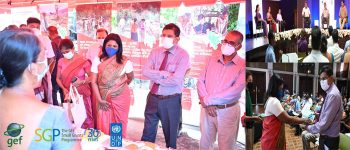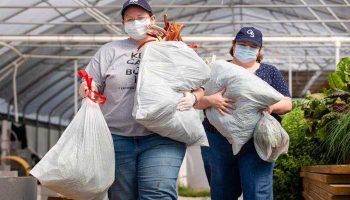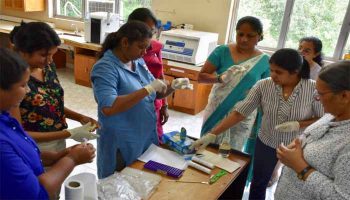Symposium on Strengthening Good Practices and Promoting Policy initiatives in the Knuckles Landscape

Spanning approximately 21,000 hectares, the Knuckles Mountain Range is a biodiversity hotspot and habitat for numerous species endemic to the region. As of 2010, the Knuckles Conservation Forest has formed a part of the designated Central Highlands of UNESCO World Heritage Property, including the Peak Wilderness Protected Area and the Horton Plains National Park.
In efforts to conserve the forest and mitigate threats such as encroachment, seasonal fires, illegal logging, gem mining, disorganised expansion and tourism, the Small Grants Programme (SGP) of the United Nations Development Programme (UNDP) in Sri Lanka, and funded by the Global Environment Facility (GEF), contributes to ensuring biodiversity conservation, soil conservation and promoting agroecology in the Knuckles Conservation forest and its buffer zone.
Comprising 35 peaks, this mountainous terrain was identified as a landscape that can enable community-based organizations to take collective actions for adaptive landscape management for socio-economic resilience. Between 2017 and 2021 through its Sixth Operational Phase, GEF-SGP provided grants to 14 community organizations to address biodiversity conservation, land degradation prevention and knowledge management. The resulting success stories and lessons learnt were showcased at the Knuckles Policy Forum held recently at the Plant Genetic Resource Centre in Gannoruwa, highlighting how communities came forward to safeguard the nature around them, essential for their wellbeing and livelihoods. The forum was attended by representatives from the Government and State sector, members of the National Steering Committee, Civil Society Organizations, Private Sector, UN and Development sector.
Speaking at the event, Dr. Anil Jasinghe, Secretary to the Ministry of Environment stated “The GEF-SGP embodies the very essence of sustainable development through ‘local action, global impacts’, by providing financial and technical support to projects that conserve and restore the environment while enhancing people’s wellbeing and livelihoods. SGP demonstrates that community action can maintain the delicate balance between human needs and environmental imperatives…I am happy that the Ministry of Environment has played the lead role in this effort by providing national policy guidance to implement the activities with the NGOs and CBOs supported by the GEF-SGP in the Knuckles landscape.”
Eco-tourism development initiatives to create sustainable income sources for the communities, and the documentation of traditional knowledge was emphasised as high priority initiatives. Herpetological Foundation Gte. Ltd. (HFSL), Dumbara Mituro Environment & Cultural Foundation, National Ethnic Unity Foundation (NEUF), Arunalu Community Development Centre, Community Development Centre (CDC), Centre for Integrated Indigenous Knowledge Systems (CIIKS), Community Resource Protection Centre (CRPC), Grama Abiwurdhi Foundation for Environmental Conservation (GAFEC), People’s Livelihood Development Foundation (PLDF), Anurudha Arana Trust (AAT), Integrated Community Development Women’s Federation (ICDWF), Nirmanee Development Foundation, Rangiri Thakshana Piyasa, Sri Lanka Environment Exploration Society (SLEES), were all grantees that willingly empowered their communities to protect and conserve forests while researching and adding new knowledge to the understanding of the richness of the biodiversity of the area.
Congratulating the grantees on their success, Mr. Robert Juhkam, Resident Representative of UNDP in Sri Lanka noted, “ UNDP’s Small Grants Programme in the Knuckles Conservation Forest and its Buffer Zone landscape has contributed to the promotion of Agro-ecology, Biodiversity conservation, Soil conservation and Wetlands rehabilitation, along with the discovery of 10 new endemic herp species which includes 6 snakes, 3 amphibians and 1 skink, a truly remarkable achievement for the project. Using a landscape approach where we work with communities and multi stakeholder groups through the lessons learnt, and the dedicated symposiums will aim to highlight, upscale and promote these policy initiatives and results.”
The initiatives implemented by the project have empowered communities that had suffered heavily due to climate variations and extreme weather events in the past, while helping to inform green recovery efforts towards biodiversity protection and climate change adaptation in Sri Lanka.
Read more: Local Action, Global Impact- Voices from the Knuckles Landscape






